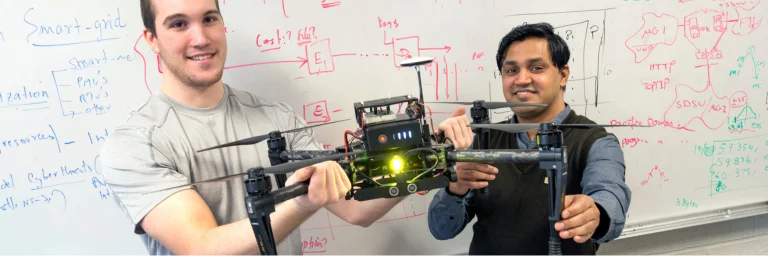|
UND’s online accelerated Electrical Engineering degree is the fastest way to complete
your bachelor’s and master’s E.E. degrees. In addition to saving time by double counting
some courses, you’ll pay affordable online tuition regardless of your legal residency.
Flexibility is critically important to our online students. That’s why we’ve designed
the accelerated online Electrical Engineering degree to be 100% online. You are never
required to visit campus. All labs are completed remotely by purchasing lab kits.
LAB REQUIREMENTS
Flexible Online Accelerated Electrical Engineering Courses
Over a third of UND's student population is exclusively online; plus, more take a
combination of online and on campus classes. You can feel reassured knowing you won't
be alone in your online learning journey and you'll have resources and services tailored
to your needs.
No matter how you customize your online experience, you’ll get the same top-quality
education as any other on campus student.
- Same degree: All online programs are fully accredited by the Higher Learning Commission (HLC). Your transcript and diploma are exactly the same as our on-campus students.
- Same classes: You’ll take courses from UND professors, start and end the semesters at the same time
and take the same classes as a student on campus.
- Real interaction: You can ask questions, get feedback and regularly connect with your professors, peers
and professionals in the field.
- Your own academic advisor: As an invaluable go-to, they’re focused on you, your personal success and your future
career.
- Free online tutoring: We're here to help you one-on-one at no cost. Plus, get access to a variety of self-help
online study resources.
- Unlimited academic coaching: Need support to achieve your academic goals or feeling stumped by a tough course?
We'll help with everything from stress and time management to improving your memory
to achieve higher test scores.
- Full online access: Dig into virtual research from the Chester Fritz Library. Improve your writing skills
with online help from the UND Writing Center. Get online access to career services,
veteran and military services, financial services and more.
- 24/7 technical support: UND provides free computer, email and other technical support for all online students.
- Networking opportunities: Our significant online student population means you’ll have a large pool of peers
to connect with. UND has numerous online events and activities to keep you connected.
Best Online College
Our high alumni salaries and job placement rates, with affordable online tuition rates
make UND a best-value university for online education. UND's breadth of online programs
rivals all other nonprofit universities in the Upper Midwest making UND one of the
best online schools in the region.
UND ranks among the best online colleges in the nation for:
- Affordability
- Student satisfaction (retention rate)
- Academic quality (4-year graduate rate)
- Student outcomes (20-year return on investment per Payscale.com)
Top-Tier Accelerated Electrical Engineering Online Degree
Over a third of UND's student population is exclusively online; plus, more take a
combination of online and on campus classes. You can feel reassured knowing you won't
be alone in your online learning journey and you'll have resources and services tailored
to your needs.
No matter how you customize your online experience, you’ll get the same top-quality
education as any other on campus student.
- Same degree: All online programs are fully accredited by the Higher Learning Commission (HLC). Your transcript and diploma are exactly the same as our on-campus students.
- Same classes: You’ll take courses from UND professors, start and end the semesters at the same time
and take the same classes as a student on campus.
- Real interaction: You can ask questions, get feedback and regularly connect with your professors, peers
and professionals in the field.
- Your own academic advisor: As an invaluable go-to, they’re focused on you, your personal success and your future
career.
- Free online tutoring: We're here to help you one-on-one at no cost. Plus, get access to a variety of self-help
online study resources.
- Unlimited academic coaching: Need support to achieve your academic goals or feeling stumped by a tough course?
We'll help with everything from stress and time management to improving your memory
to achieve higher test scores.
- Full online access: Dig into virtual research from the Chester Fritz Library. Improve your writing skills
with online help from the UND Writing Center. Get online access to career services,
veteran and military services, financial services and more.
- 24/7 technical support: UND provides free computer, email and other technical support for all online students.
- Networking opportunities: Our significant online student population means you’ll have a large pool of peers
to connect with. UND has numerous online events and activities to keep you connected.
Best Online College
Our high alumni salaries and job placement rates, with affordable online tuition rates
make UND a best-value university for online education. UND's breadth of online programs
rivals all other nonprofit universities in the Upper Midwest making UND one of the
best online schools in the region.
UND ranks among the best online colleges in the nation for:
- Affordability
- Student satisfaction (retention rate)
- Academic quality (4-year graduate rate)
- Student outcomes (20-year return on investment per Payscale.com)
|
